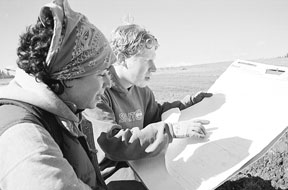The uncertain status of Greenbank Farm as a viable nonprofit venture was shored up a bit Tuesday, when the Port of Coupeville’s board of commissioners re-upped the Greenbank Farm Management Group’s lease.
The new five-year lease, prepared by Port Commissioner Ed Van Patten and reviewed during a meeting last Friday, replaces the one-year lease that expires at the end of the month.
Despite growing public concern that the farm’s day-to-day operation is directionless, the Port’s approval of the revamped lease was a vote of confidence for the farm’s executive director, Laura Blankenship.
During discussions with the port commissioners over the terms of the lease, Blankenship requested a multi-year lease for more “stability,” and the board apparently agreed with her. The new lease runs for two years, after which it is renewable for another three. For the duration of the lease, specific terms are not up for negotiation. The only aspect of the lease that can fluctuate is the management fee. That fee is currently $40,000 per year.
The lease also puts another of the farm’s buildings — the caretaker’s residence at the south end of the property — under the management group’s control.
Blankenship said that under the previous lease, she had one year to pull the farm “out of the hole.” With the new lease in place, she said she “needs to get going.”
Management group president Clarke Harvey seemed pleased with the new lease.
“We think this works well for us, because we’re looking for some stability,” he said Tuesday.
Van Patten agreed that the lease was a good fit.
“I think we’ve done a good job at putting together what needs to be put together for a lease here,” he said. “We’ve got the terms down the way we want them and the way the farm wants them.”
Not all news, however, was so cheery. At the first meeting with the Port on Feb. 13, Blankenship reported that she had recently been turned down for a $150,000 United States Department of Agriculture grant to rehabilitate one of the barns into an arts center. The Port of Coupeville had agreed to match the USDA grant with a minimum of $50,000 for the project. Minus the grant, Blankenship asked the port commissioners if they would be willing to keep their money on the table. She said the farm could use fund-raisers to come up with another $50,000.
With donated labor, Blankenship, said the fund-raising campaign might need to raise only $100,000 total to complete the project.
Greenbank Farm also was skipped over for any payouts from Island County’s lodging tax. The tax fund, which this year totaled $84,210, is awarded to agencies that promote and support tourism throughout Island County.
On top of these worries, Port commissioner and chairman Mike Canfield said this year’s Greenbank Farm’s Loganberry Festival is scheduled for the same weekend as the Bellevue Arts & Crafts fair, July 27-28. The Bellevue event is one of the largest such festivals in the state. The commissioners said this would certainly cause a drain on attendance at the farm event.
“It definitely will have an impact on it,” Canfield said.
The lack of money and unfortunate state of farm activities leaves the farm floundering for purpose. The farm no longer grows the loganberries it was once known for. Also, the management group recently phased out the farm’s gift shop, and sold off a number of fixtures and other items from one of the barns.
The farm’s wine shop and wine-tasting counter remains, selling a variety of wines from local wineries, including Greenbank’s Loganberry Wine, which is produced and bottled in Hoodsport.
In a recent letter to the editor in the Whidbey-News Times, Blankenship responded to concerns that the Greenbank Farm “had been going backward.” Such moves as liquidating gift store inventory, she said, were undertaken to build a financial base from which a new set of goals could be initiated.
“Our job was to create opportunities,” Blankenship wrote.
She said the farm doesn’t want to compete on the open market with local businesses and farmers. The farm’s plan is to lease out much of thespace for both farming and events, such as weddings and conferences.
Blankenship bandied about several ideas recently concerning potential capital improvements to Greenbank’s facilities. The farm could install a for-lease commercial kitchen in the Jim Davis House, which is located just north of the farm utility building. Blankenship has also looked into installing a radiant floor heating system in one of the barns. She recently received a cost estimate of about $21,000 for a full heating system.
“That is the single area that we could make the biggest difference,” Blankenship said. “We could rent that barn year ’round if we could get some heat in there.”
Currently, work is also being done on the farm’s land. A South Whidbey AmeriCorps team member, Leah Peterson, has been helping farm agricultural director Fred Petit develop a children’s garden next to the Jim Davis House. There are plans to create a community pea-patch, and the management group has also received proposals for other land usages, such as organic livestock grazing.
“We’ve been extremely busy,” Blankenship told the Port of Coupeville commission at the Feb. 13 meeting.



